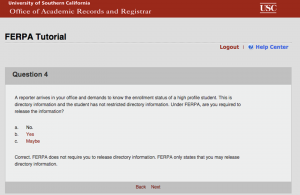COLUMN: FERPA eliminates lazy college kid stereotype
With a new semester in full swing, college students have a lot on their plates. Some midterms have already begun, Leavey Library is getting more and more crowded each night and flashcards are a common accessory in the Campus Center.
But before we finalize our study schedules, college students should plan on committing one more term to memory: FERPA.
The Family Educational Rights and Privacy Act, colloquially known as FERPA, is the academic version of the Health Insurance Portability and Accountability Act, or what we know as HIPAA. It is our confidentiality contract with our higher education institution. Through this act, USC is legally obligated to guard our education records from prying eyes and to defer any inquiries about academic records directly to the student.
TL;DR: FERPA says USC puts the student as the chief executive of his or her private academic information. It’s supremely important for us to finally shed the image of the lazy millennial.
The legislation has been around for more than 40 years, about a decade before Generation Y even hit the scene. FERPA lasts even after our college careers end, so it’s likely that most of our parents are also covered by the act.
A recent Los Angeles Times article claimed “college students have too much privacy.” To prove their point, they included a horror story about how a parent was kept in the dark for years about their child not actually graduating.
This is not a once-in-a-lifetime story, USC’s Associate Registrar Bob Morley told me. In his 30 years in academia, he has encountered a handful of parents who didn’t know about their kids’ academic struggles. Since FERPA’s enactment, parents have lobbied Congress to loosen its restrictions on guarding their child’s records from them.
Poor parents, right? FERPA’s motto should be: “Don’t ask, because I can’t even tell you.”
FERPA even carries weight overseas. Therefore, when I was abroad last semester, I could have not shown up to a single class and still my parents would not have been notified. Granted, I would have probably had to answer to other pressures, such as my GPA.
Gordon Stables, associate dean of student affairs at the Annenberg School for Communication and Journalism, acknowledged that it’s “sometimes hard for family members to hear” that they have to ask their children to grant them access to their records. Especially if they’re footing the bill for this world-class education.
But millennials need FERPA more than ever right now. We already get a bad rap for not doing enough for ourselves. The term helicopter parents and “ME” generation comes to mind when thinking of ways millennials are hyper-dependent.
“How students and parents negotiate that is something that I wish we had a better handle on,” Morley said. “One of the things I see with millennials is that they are so connected with their parents I can’t believe it. So there’s an ongoing really good communication, several times a day sometimes, but sometimes there’s a disconnect for important things like, ‘How are you doing in school?’”
And it makes sense. We’re flooded with so much information. Sometimes it’s easier for our parents to do for us what we feel like we don’t have time to do for ourselves.
Part of it is that, unlike your Twitter timeline or a Sparknotes summary, FERPA at its surface does not seem quickly consumable. The act has grown so many branches that the childhood game “20 Questions” is needed to decipher its reach.
 I’m not even joking. On the Office of Academic Records and Registrar, there’s a FERPA tutorial modeled after “20 Questions.”
I’m not even joking. On the Office of Academic Records and Registrar, there’s a FERPA tutorial modeled after “20 Questions.”
“There’s still so much confusion,” Stables said. “In some way with the greater access of information today and the ability for us to look at your STARS report in real time on our phones, it’s becoming increasingly important to educate someone on the security of their records.”
This generation needs FERPA to depend less on technology and our guardians and become the main executors of our academic careers. The federal government’s laws reflect its faith in our ability to do for ourselves.
“It’s the student who is the individual that makes the decision to attend the university,” Stables said. “It defines the relationship between the student and school. It’s the student earning the grades, and it’s the student’s whose privacy is in the record.”
With this power, we need to exercise great responsibility.
That means learning the full extent of the act. FERPA shows that those in power still believe in us millennials to do for ourselves. Let’s not prove them wrong.
After reading “Wait An L.A. Minute” on Tuesdays, join Jordyn Holman in her millennial conversations on Twitter @JordynJournals. She’s a senior studying print and digital journalism.
